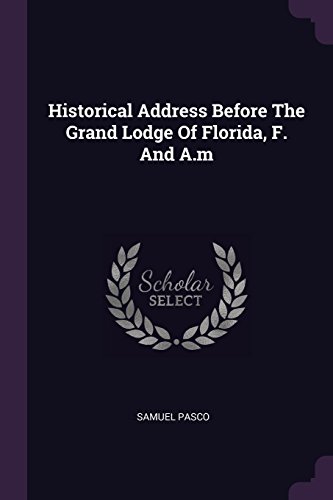Background
Samuel Pasco was born on June 28, 1834 in London, England. He was the son of John and Amelia (Nash) Pasco. In 1842 his parents emigrated to Prince Edward Island and in 1846 settled in Charlestown, Massachussets.



( This work has been selected by scholars as being cultur...)
This work has been selected by scholars as being culturally important, and is part of the knowledge base of civilization as we know it. This work was reproduced from the original artifact, and remains as true to the original work as possible. Therefore, you will see the original copyright references, library stamps (as most of these works have been housed in our most important libraries around the world), and other notations in the work. This work is in the public domain in the United States of America, and possibly other nations. Within the United States, you may freely copy and distribute this work, as no entity (individual or corporate) has a copyright on the body of the work. As a reproduction of a historical artifact, this work may contain missing or blurred pages, poor pictures, errant marks, etc. Scholars believe, and we concur, that this work is important enough to be preserved, reproduced, and made generally available to the public. We appreciate your support of the preservation process, and thank you for being an important part of keeping this knowledge alive and relevant.
https://www.amazon.com/Historical-Address-Before-Grand-Florida/dp/1378385640?SubscriptionId=AKIAJRRWTH346WSPOAFQ&tag=prabook-20&linkCode=sp1&camp=2025&creative=165953&creativeASIN=1378385640
Samuel Pasco was born on June 28, 1834 in London, England. He was the son of John and Amelia (Nash) Pasco. In 1842 his parents emigrated to Prince Edward Island and in 1846 settled in Charlestown, Massachussets.
Samuel Pasco attended the public schools and then entered Harvard College, from which he received the Bachelor of Arts degree in 1858.
Early in 1859 Samuel Pasco went to Jefferson County, Florida, to take charge of the newly organized academy at Waukeenah. Two years in Florida made him an ardent Southerner, and at the outbreak of the Civil War he enlisted as a private in Company H of the 3rd Florida Infantry. He rose to the rank of sergeant and, although his duties were largely of a clerical nature, saw heavy fighting. He was wounded and taken prisoner at the battle of Missionary Ridge. Released on parole after almost a year and a half of confinement in hospitals and at Camp Morton, Ind. , he was a convalescent at his home in Florida at the end of the war. The fifty years of his life after the Civil War were devoted almost entirely to politics, in which he proved himself an adroit leader of the Democratic party. After the resumption of his teaching at Waukeenah for a year, he served for two years as clerk of the circuit court of Jefferson County, until removed from office by the Carpetbag régime in 1868. He then entered the law office of his old regimental commander, W. S. Dilworth, with whom he shortly afterward formed a partnership.
Samuel Pasco practised law at Monticello, the county seat of Jefferson County, until his election to the United States Senate in 1887. From 1872 to 1878 he was a member of the state Democratic committee, and as its chairman in 1876 he was influential in the compromise that restored home rule to Florida. He was a member of the Democratic national committee from 1880 to 1900 and was elector-at-large in 1880 and in 1908. He was president of the Florida constitutional convention in 1885, was elected a member of the state House of Representatives in 1886, and became speaker of the House when it was organized in 1887. He was an unsuccessful candidate for the Democratic nomination for governor in 1884. He served in the United States Senate from May 20, 1887, to April 19, 1899. A fair estimate of his service in the Senate would seem to be that he was a useful senator but not a distinguished one. During his first term his most important committee assignments were those of claims and of public lands, to the latter of which he was appointed in 1891.
With the beginning of his second term in 1893, when his party controlled the Senate, he became chairman of the committee on claims and the next year was appointed to a vacancy on military affairs. His work was chiefly of a routine and local character, and he spoke infrequently on the larger issues then agitating the nation. He was defeated for the nomination for a third term in 1899 but was appointed a member of the Isthmian canal commission, in which capacity he served until 1904. Throughout his life he spoke frequently on various subjects and published occasional pamphlets. He wrote the chapter on Florida in H. A. Herbert's Why the Solid South? (1890) and Jefferson County, Florida (1910), which after his death was published in the Florida Historical Society Quarterly (October 1928, January 1929). Samuel Pasco died on March 13, 1917.
( This work has been selected by scholars as being cultur...)
Samuel Pasco was a member of Democratic party.
On October 28, 1869, Samuel Pasco was married to Jessie, the daughter of William Denham of Monticello. They had five children.
